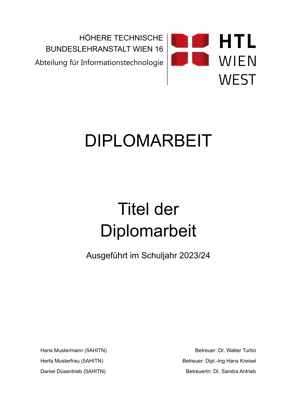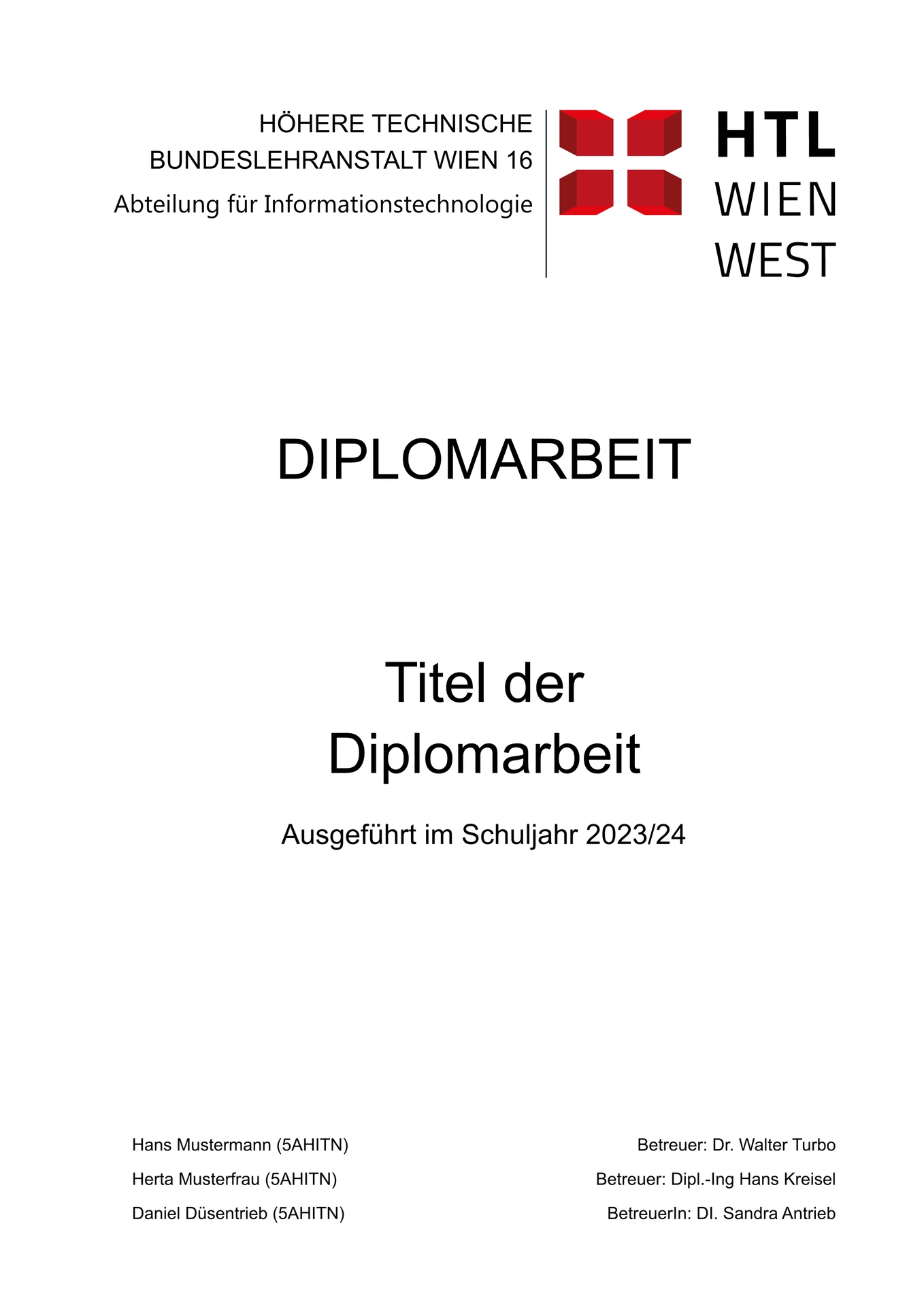This is a Typst diploma thesis template for students of the HTL Wien West. It fulfils all the necessary requirements for the diploma thesis.
 |
 |
 |
 |
Usage
You can use this template in the Typst web app by clicking “Start from template” on the dashboard and searching for htlwienwest-da.
Alternatively, you can use the CLI to kick this project off using the command
typst init @preview/htlwienwest-da
Typst will create a new directory with all the files needed to get you started.
Configuration
This template exports the diplomarbeit function with the following named arguments:
titel:string- The title of the thesisschuljahr:string- The current school yearabteilung:string- The student’s departmentunterschrifts-datum:string- The submission dateautoren:array(dict)- An array of all authors, represented as dictionaries. Each of them has the following propertiesvorname:string- Firstname of the studentnachname:string- Lastname of the studentklasse:string- School class of the studentbetreuer:dict- The student’s advisor as dictionaryname:string | content- The advisor’s namegeschlecht:"male" | "female"- Gender of advisor for correct gendering
aufgaben:content- The student’s responsibilities
kurzfassung:content- Abstract in german as content blockabstract:content- Abstract in english as content blockvorwort:content- The thesis’ prefacedanksagung:content- Acknowledgementanhang:content | none- Appendixliteraturverzeichnis:function- The bibliography prefilled with the BibTex file path
The function also accepts a single, positional argument for the body of the paper.
The template will initialize your package with a sample call to the diplomarbeitfunction in a show rule. If you want to change an existing project to use thistemplate, you can add a show rule like this at the top of your file:
#import "@preview/htlwienwest-da:0.1.0": *
#show: diplomarbeit.with(
titel: "Titel der Diplomarbeit",
abteilung: "Informationstechnologie",
schuljahr: "2023/24",
unterschrifts-datum: "20.04.2024",
autoren: (
(
vorname: "Hans", nachname: "Mustermann",
klasse: "5AHITN",
betreuer: (name: "Dr. Walter Turbo", geschlecht: "male"),
aufgaben: [
#lorem(100)
]
),
(
vorname: "Herta", nachname: "Musterfrau",
klasse: "5AHITN",
betreuer: (name: "Dipl.-Ing Maria Kreisel", geschlecht: "female"),
aufgaben: [
#lorem(100)
]
),
kurzfassung: [
Die Kurzfassung muss die folgenden Inhalte darlegen (§8, Absatz 5 Prüfungsordnung): Thema, Fragestellung, Problemformulierung, wesentliche Ergebnisse. Sie soll einen prägnanten Überblick über die Arbeit geben.
],
abstract: [
Englische Version der Kurzfassung (siehe #link(<Kurzfassung>)[_Kurzfassung_])
],
vorwort: [
Perönlicher Zugang zum Thema. Gründe für die Themenwahl.
],
danksagung: [
Dank an Personen, die bei der Erstellung der Arbeit unterstützt haben.
],
anhang: include "anhang.typ", // entfernen falls nicht benötigt
literaturverzeichnis: bibliography.with("literaturverzeichnis.bib")
)
// Your content goes below.
Provided Functions
Beside the diplomarbeit function, the template also provides the autor function that is used after a heading to indicate the specific author of the current section.
== Some Heading
#autor[Your Name]
This will render additional information to the section’s heading.
To install the template locally, you can use
just install
which uses the just command runner.
If you don’t want to install just, you can run
bash ./scripts/package @local
The installed version can be used via @local instead of @preview. To create a new typst project from the template, run
typst init @local/htlwienwest-da:<version-in-typst.toml>

